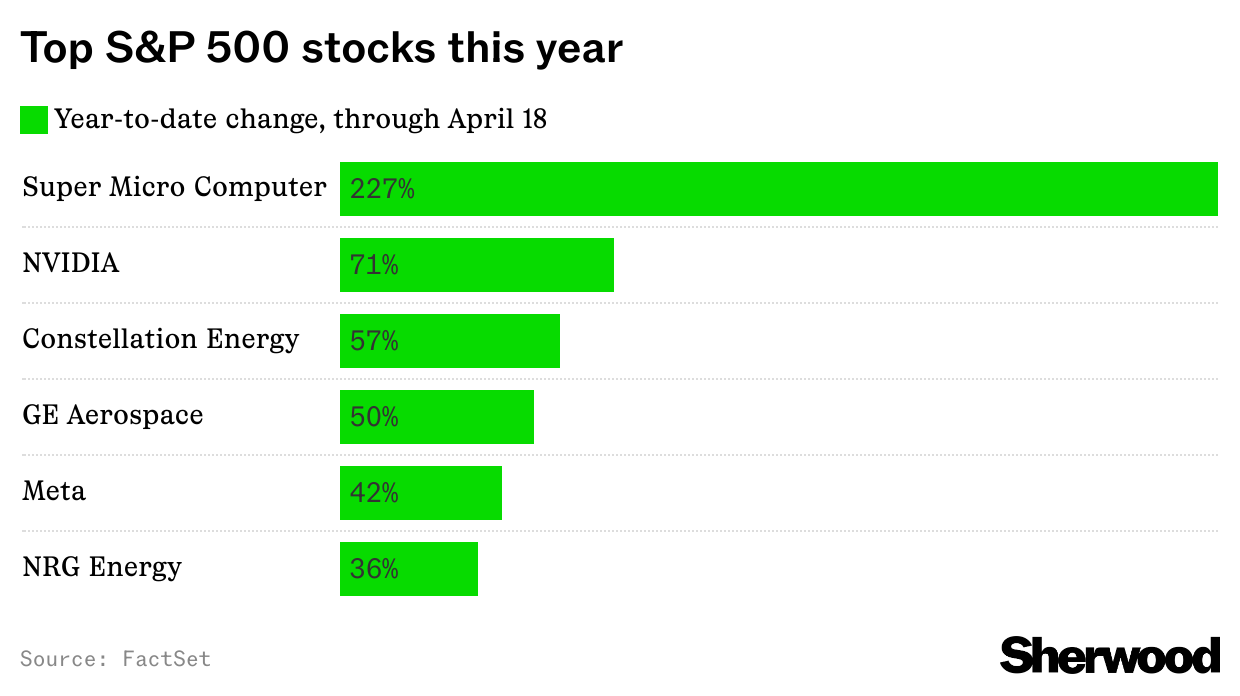Friday May.27, 2022
🙃 Netflix, upside down
At $30M an ep, we’d be smiling too (Bryan Bedder/Getty Images for Netflix)
Hey Snackers,
Not even the business luminaries at Davos were spared from inflation. On the menu at the World Economic Forum, which just wrapped up in Switzerland: a $51 burrito and a $22 side of fries.
Stocks rose for a fifth straight day on the back of retail earnings that weren’t as dire as expected, putting the S&P 500 and Nasdaq on track to end their seven-week losing streaks.
Ta-dum
Netflix quadrupled down on “Stranger Things,” which may make it harder to find its next “Squid Game”
Dialing it up to Eleven… Grab some popcorn: the fourth season of one of Netflix’s OG hits, “Stranger Things,” drops today. But the premiere comes at a strange time for the streamer, which is trying to reverse its first subscriber loss in more than a decade.
- Monster-sized marketing: Netflix transformed 15 global landmarks — like the Empire State Building and a Polish castle — into giant “ST” ads.
- Big budget: Each of the nine “ST” episodes this season reportedly cost $30M to produce — more than the combined annual salaries of all 150 employees Netflix laid off this month.
It’s been 36 weeks since “Squid Game”… and Netflix is desperate for another huge hit. It’s lost nearly 70% of its market cap this year. To reverse its stock slide, Netflix has started cutting costs by laying off staff and telling employees to curb spending — and even starting work on a free ad-supported tier. But there’s one place Netflix still isn’t skimping: content.
- Still king: Last year Netflix made 500 originals. This year it plans fewer, but still aims to spend $20B on content (an increase over ’21). Translation: hit shows get more $$, but you get fewer new shows to binge.
Cutting costs comes with a cost… Splurging on content is in Netflix’s DNA: it became the top streamer by bankrolling hits like “The Crown” ($520M and counting). But now it’s in a predicament: it needs to cut costs to compete with faster-growing rivals like HBO and Apple — and it can’t afford to turn off its content firehose. Doubling down on existing shows could cost Netflix to miss out on its next surprise hit. “Squid Game,” Netflix’s most-watched show ever, cost 1/12th of one episode of “Stranger Things.”
Cloudy
Broadcom gets into the lucrative world of enterprise software with its VMware acquisition — if regulators don’t step in first
Mega-deal alert… Yesterday, chipmaker Broadcom confirmed plans to buy software developer VMware for $61B — what would be the third-largest tech deal in history and one of the biggest overall deals of the year. Refresher: VMware was one of the pioneers of early cloud-computing tech for big biz (aka: the $672B enterprise market), and was spun off last year by its former owner, Dell. What’s on the table:
- Broadcom expands its mostly chip-based portfolio by tripling its software biz, which the company has been growing through smaller acquisitions. VMware also gives B’com a foothold in the boring-sounding but lucrative world of corporate data centers.
- VMware partners with all the big cloud providers, like Google, Microsoft, and Amazon, meaning Broadcom becomes a more integral part of the “plumbing” of the modern internet.
Broadcom’s bag of chips… has a lot of variety. From WiFi and Bluetooth to powering appliances, Broadcom’s semiconductors play a crucial component in connecting most of your everyday gadgets. But in the past year the global chip shortage has forced the company to limit how many orders it can fill, sacrificing sales. Enterprise software is an attractive way for B’com to diversify because it’s a strong market filled with deep-pocketed customers that provide recurring revenue streams.
Nothing’s done till it’s done… Broadcom tried to buy rival chipmaker Qualcomm in 2018 but was blocked by the Trump administration on antitrust and national-security grounds. Even though VMware isn’t a direct rival, the Biden administration has been skeptical of big corporate tie-ups: it recently sued to block a different chip merger between Nvidia and Arm, which led to the deal’s collapse.
What else we’re Snackin’
- Chicken: Costco brought in $1B more than expected in sales last quarter, as members flocked to its cheaper gas prices and then stuck around to shop. But those revenues didn’t translate into better-than-expected profit.
- Bargain: Middle-class shoppers are going deal-hunting down-market. That’s the earnings story from Dollar Tree and Dollar General. Both chains boosted their outlooks, as they tend to outperform when the economy stalls.
- Drill: The UK is hitting oil companies like BP and Shell with a 25% “windfall tax” meant to help consumers with soaring energy prices. Critics say the tax will discourage investment and lead to even higher prices.
- Fly: Jack Dorsey stepped down from Twitter’s board (as planned ever since he left the CEO gig). He’s reportedly been talking to Elon about rolling his ownership stake into the takeover bid (which is still on, BTW).
- TKO: Justin Timberlake sold his music catalog for $100M to a Blackstone-backed management firm. JT is the latest (and one of the youngest) musicians to sell his body of work in a hot market for streaming rights.
Friday
- Earnings expected from: Big Lots, Pinduoduo, and Canopy Growth
Authors of this Snacks own shares of Amazon, Apple, Canopy Growth, Google, Microsoft, Netflix, and Twitter
ID: 2221138
.png)

